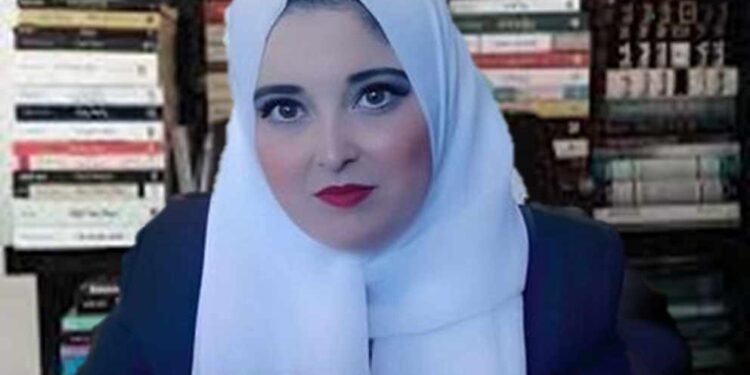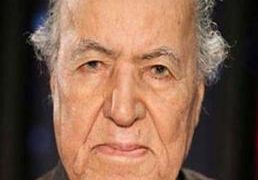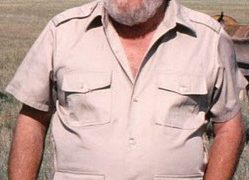Dr. Nour Al-Huda gorbaz from Algeria to Voice of My Country: Thoughts of the Novel is a qualitative new shift in the field of writing, full of thorns of criticism and rejection, and artificial intelligence kills creativity, and in our country it is rare to find a professional literary editor worthy of the title.
Interview by Elham Issa
Dr. Nour Al-Huda gorbaz, an academic doctor, a creative writer, critic, and novelist, flies with us high in the spaces of her writings, creations, and the weaving of her letters. She writes with a pen of light in a dazzling manner, soaring to us with the wings of her letters. Her letters flow in a sweet way through the ports of the homeland that lies deep within us. She writes in a winged way toward the sparkling clouds of the morning. Our groans, our longings, our pains, our questions. Through words that she writes with ink of light, she translates our dreams that have fled from us and puts us before ourselves and within us, so memories and events that go deep into history lift us up, remind us of what has passed and what has been erased from our identity and heritage, and what has been hidden from the world of truth. They lift us up deep into the depths of history, from which we draw inspiration from the glow of advancement and aspiration towards a future of rich horizons that translate Our dreams haunted deep within us, in her writings, she takes us to vast, deep spaces of time, leaving many questions for the reader among the texts of the narrative. She directed her pen to point out mistakes and dangers in society, letting her imagination ripple and sail through these stations with a soaring rhythm and smooth, easy language, hoping that you will find an enjoyable reading of this dialogue, which is rich in itsو vocabulary. It is rich in content and new proposals that would present new ideas on the cultural and literary scene Dr. Nour Al-Huda Qorbaz
Doctorate in Arabic Narratives at Mohamed Kheidar University in Biskra
Who is she to the reader, follower, and intellectual, and how do we get to know her?
Dr. Nour Al-Huda Qorbaz
Master’s…..
doctor ……
Writer and critic
a professor
Mohamed Khaydar Biskra – Algeria
Member of the Technical Committee of the Modern Literary Renaissance
Cultural Ambassador at the Abukni Academy of Popular Culture, Republic of Uruguay
Associate member of the Academy of Modern Latin Literature, Acapulco, Mexico
Two critical studies were published on the collected Arab Diwan on Rabiet Al-Buh
And the poetry collection The Sun Does Not Roam Twice by the Egyptian poet Muhammad Abdel Aziz Shamis
And a global participation with the Inner Child Press Foundation with the contemporary anthology Messages for the Dead
How do we search for humanity in this chaos? Do adversity produce healthy literature?
This literature expressed the individual and his place in this world; it talked about the writer’s struggle against the forces that try to harm his people and his country, crush a personality, isolate him, and strip him of his identity…the obliteration of identity, the taking of the land, displacement, the forcing of a certain way of life. Therefore, we must not forget that Literature is now a form of resistance on a broader level with the development of life and the emergence of greater capabilities such as artificial intelligence, which, although positive, reduces effort and time.
Does literature today live and breathe a healthy atmosphere and participate in major humanitarian issues that concern humans, and is it an influential factor on Earth, in your opinion?
Literature played a wonderful role when people were in danger. The psychological factor and the pain the writer character suffers about what happens to her makes us as readers ask: How did this writer or others make us live in human situations??
Because literature is beauty and, above all, stems from human values. For example, when we read “Najma” by Yacine, which talks about the Algerian revolution in all its symbolism, the author opens his novel with questions about the nature of revolution and pain, but when we delve into the narrative text, we find it moving to different historical, ideological, philosophical and religious dimensions. Also the novel, Incense of Eden, which talks about the previously peaceful and loving Incense of Eden.
Irrigated with Blood Today, I wish it would return. When we read it, we were not just browsing the papers, but rather we were living and diving into the homes, markets, and alleys of Aden in that period of time, smelling the scent of the places that the writer relied on to humanize, so that( Al-Muqr)i assures us that he is the son of (Taiz), crossing all cultural backgrounds, relying on a symphony. Art and beauty made Aden a meeting place for all sects: communism, Sufism, Marxism,
There are major challenges facing Arab and international literature. Do you agree with this opinion? If so, how can we face these challenges and work to overcome them?
Throughout its stages, it suffered from collision courses from the closure of the text to its opening
Also, the crossing of the genre and the dissolution of the literary genres, it is a new genre that received its techniques and modified its genre path to become a generative text. From the beginning, there was the epic novel, the autobiographical novel, passing through the poetic narrative or narrative poetry, the descriptive language, and the story novel. Despite the rejection of these labels at the beginning, the globalization of texts made them It is inevitable with literary cognitive variables, and this overlap is not the result of coincidence, but rather the result of creation
Has culture today become intertwined, that is, the interpenetration of the literary text with the technological medium?
Culture today has become intertwined, that is, the interpenetration of the literary text with the technological medium. The novel is capable of creating a chemistry of interaction through presentation, reception, and interaction. It has moved from the unilateralism of production to the participation of the recipient and the interaction of the recipient, and from the limitation of reading to the infinity of publication.
Does artificial intelligence, despite its positive aspects, threaten humans and humanity, and does it kill creativity, competition, and talent under the guise of development and keeping pace with the modern era?
Artificial intelligence is the killing of creativity and competition. It makes us agree to the machine age and the objectification of man, and with time nothing will remain of man except his name because we stripped him of his noble feelings and contributed to killing his talent under the guise of development and keeping up with the times. The resistance turns to stopping the advance of the machine and trying to search for man in this chaos because the resistance It is “a revolutionary reaction for the writer and also for literature, because the ordeal gave us a mature literature, because a calm sea does not make a skilled sailor.” And the literary anxiety that the writer imbibed from existential philosophy made him struggle to think to find solutions to the problems of his time.
The emergence of the problem of the center and the margin in literature has disturbed the creators and made them struggle with an enemy… who is more like the wind that Dan Quixote fought, in their attempt to reach the center, which is the capital, because the great writer is the son of the city, not the son of the suburb or the village, which is considered an entity that lacks the simplest necessities of life. A dead place for life. Because chauvinistic literature is what is trumpeted in festivals and forums. As for it, it is a literature whose pioneers are condemned to darkness and whose writers are condemned to remain in the dark, away from the lights, because it is literature that rejects ready-made templates.
The Renaissance Literary School is an entity and literary, scientific, cultural and cross-border achievement that works to collect Arab culture and revive it by uniting Arab pens throughout the Arab world on the one hand, and on the other hand, contact with other global cultures, bringing viewpoints closer, and returning to the bright ages. What did it offer you while you were one of its members, and what is it? Her next new thing?
The Renaissance Literary School is a literary entity and a scientific forum that unites the Arabs through which we seek to integrate Arab culture and return Arabic literature to its bright eras by creating a healthy, competitive, balanced, dynamic literature, as well as contact with other global cultures within the framework of the theory of comparative literature and the universality of literature to impose our Arab literature, which was and still is master. The field is not defended, and this is what we found among the ancients, Al-Buhturi, One Thousand and One Nights, etc The Renaissance Literary School is an idea and a literary activity, a non-political entity that is concerned with literature, beauty, and humanity first. It relied on foundations and rules upon which it was based, making it a pioneer in unifying the literary class through the first unified collective work on Rabieh Al-Bouh was followed by Arab and international works. Today, after the school has matured and its founders have matured, and I am proud to have been among them, we seek to put forward more important ideas that I will not mention now because they are within the prerogatives of the school president.
What do you think of the term network intellectual?
The Iraqi thinker (Ali al-Wardi) says: “Ideas are like weapons that change with the passing of days. The one who wants to maintain his ancient ideas is like one who wants to fight a machine gun with a weapon… the weapon of Antara Ibn Shaddad. The term “network intellectual” has emerged, which is considered a threatening ogre to the writer. Typical classic.
Is the intellectual dead in your opinion?
Unfortunately, yes, because it wears the cultural mask of unemployment
As for the negative side
We find the appearance of the creator “rejecting any criticism based on the block policy” which makes this text provocative and difficult to confront, because it carries provocative ideas dressed in the guise of controversy, which is spun with threads of challenge and explosion.
Social media has made the creative person get out of his silo; criticize, write, write in order to clarify, and criticize so as not to allow time to escape and interpretation, the trial of the objectification that has afflicted the researcher.
He also writes to purify himself of his psychological illnesses, such as alienation
No matter how much the creative person fled into self-imposed exile, social media forced him to reveal, because the digital storm disrupted what was prevalent and provoked the creative person to respond.
It breaks the windows of illusion that sometimes hide rusty souls – the gift of ownership that the writer previously enjoyed has no longer returned because his text and opinion have become the property of everyone.
But despite all its positives, its negatives remain many as well
– Weakening the Arabic language through the use of foreign vocabulary – The measure of the quality of the writer became expression icons “likes” – The emergence of critics of events and favoritism
If so, why?
Because of the disruption of the writer’s intimacy, which remains sacred, because the excitement of the paper remains as long as the good creator lives – some works are subject to theft – the emergence of a generation that loves ready-made work, a generation that does not have the patience and patience to produce fine work, but rather work with scattered ideas and literary thefts abound. In the end, social media remains in control of Our current time
How is political life reflected on the writer, writing, and the cultural scene, and which should lead the other, politics or culture?
Contemporary man is a mass of anxiety and disorder. The writer is part of a society suffering from loss. The writer tries to transform deaf vocabulary into dialogue by sitting at the writing table to discover the chaos and make it his pleasure linked to the pen, memory, and emotion. Discovering the lost self affected by what is happening in the world. For example, Yasmina Khadra’s novel.” “Al-Mawla’s Sheep” focused on the village as a marginalized place that did not receive the spotlight, and saw that it was the village that was subjected to injustice at the time of the ordeal, and that it and its inhabitants were marginalized. It relied on a realistic approach. It tells the story of three young men who have known each other since childhood. The village of Ghashima is suffocating them, with misery, lack of change, and rejection in their lives. The crucible of outdated traditions shows the separation of its people from the capital because they were marginalized from it, so it became irrelevant to them. The novel, The Mawla’s Sheep, depicted the village people’s suffering from poverty and misery. It is a quiet village whose children were fed laziness and lethargy. They refuse to change or transform their village from a small village into a large wilderness. The novel’s characters represented personalities Defeatist, submissive, submissive, and inert. She did not seek change or construction. Rather, she chose submission, and he did not mean the personalities, but rather the intellectual who preferred to hide behind these personalities, in order to protect himself politically and socially. He chose the symbol and watching from afar, unlike the intellectual who expressed his opinions directly, only to find himself under the grip of The executioner is either imprisoned or on the run, a refugee in another country. There is the selfish intellectual who seeks to possess the greatest amount of idols under the names of global and international awards. Therefore, we find the writer who believes in his cause rejected it and did not compromise. As for the selfish person, he made himself far away and a spectator, abandoning the pick of thought. Therefore, we find the writer an outlet. In a healthy atmosphere not polluted by politics, his pen is open and free from the authority of pirates of pens and thoughts, while the writer who suffers from the authority of shame, the dictatorship of the pen, and the diminishing authority of the limits of what is permissible, his pen flounders, neither he is changing the situation nor is he supporting it. But culture remains the crutch that corrects the distortions of politics and the sweet balm for peoples since the earliest times – Suleiman the Magnificent, Harun Al-Rashid, etc.
The globalization of texts has made it inevitable with the literary cognitive variables, as Hanna Mina puts it. I only write what I lived, saw, and suffered. Is the writer a child of his environment? Is the maturity and awareness of the writer a challenge that determines its imposition as a new art?
Does the environment affect the writer? Yes, very much. We all remember the novel The Invisible Bread by Muhammad Shukri, how it dug our wounds inside him and made him learn to write at an old age so that he could write his biography and reveal his pain and disappointments so that he would be psychologically liberated and purify himself first and so that he would hold his father socially accountable because he was oppressed and unable to respond to him, as he says in his novel.
“My father came in and found me crying over bread.
He started kicking and punching me: Shut up!! Shut up !! Shut up !! You will eat your mother’s heart, you son of a bitch. He lifted me into the air. He hit me on the ground. He kicked me until his legs got tired and my pants got wet.
On our migration route on foot. We saw the corpses of livestock, surrounded by black birds and dogs. Unpleasant odors . Torn entrails, worms, blood and pus.
At night, the howling of foxes is heard near the tent that we set up wherever fatigue and hunger stop us. People sometimes bury their dead where they fall.
My brother is coughing and coughing. I asked my mother in fear:
– Is he also going to die??
– Whoever said he would die!!
– My uncle died
– Your brother will not die, he is just sick.
In Tangier, I did not see the abundant bread that my mother promised me. I am also hungry in this paradise. But it was not fatal hunger.
When I get very hungry, I go out to the neighborhood of Ain Qatyout and search the garbage for the remains of what is eaten.
I found a child, like me, eating from the garbage, with blisters on his head and limbs, and his bare feet. His clothes were pierced and he said to me:
The city’s garbage can be better than the garbage of our neighborhood. The garbage of the Christians is better than the garbage of the Muslims.
I found a dead chicken, hugged it to my chest and ran to our house
– What are you doing, where did you steal it?
-I found her sick. I slaughtered her before she died. Ask my brother
– Crazy (she snatched her from me angrily). Humans do not eat carrion.
My brother and I exchanged sad looks, both of us closing our eyes waiting for what we were going to eat
My father returns every evening disappointed. We live in one room. Sometimes I sleep in the same place where I squat. My father is a monster. When he enters, there is no movement or word except with his permission, as if he were everything
He hit my mother repeatedly. I heard him repeatedly say to her:
– I will leave you, daughter…, manage your affairs alone with these two puppies.
He sniffs snuff, speaks alone, spits on imaginary people and insults us.
My brother is crying. He writhed in pain. Bread cries! He is younger than me. I cry with him. I see him walking to him. The monster walks to him. Madness is in his eyes. His hands are an octopus. No one can stop him. I seek help in my imagination.
Monster ! Crazy! Block him! The cursed one violently twisted my brother’s neck. My brother squirms. Blood flowed from his mouth. I ran out of our house, leaving him to silence my mother by punching and kicking.
Heaven, God’s lamps bear witness to my father’s crime
My father wails and sniffs snuff. It is strange: He kills my brother and then makes him cry
The three of us stayed up crying in silence. My brother was lying down, covered with a white cloth.
I fell asleep and left them crying.”
Therefore, we wonder how a writer who lived a horrific life could be born and grow up in the midst of what is said about him, to say the least, scum, and thus make himself a writer and also a scumbag. “In my childhood, I tried to become a welder, but I failed… because I was eating more than I sold.
– And I tried to become a tailor, but I failed… because I was sticking needles into the customer’s flesh more than I would stick them into his clothes… especially if he was progressive.
– And I tried to become an athlete and a football star, but I failed… because I believed that there were many things that had to be kicked with the foot, before that miserable rubber ball.
– And I tried to become a popular singer, but I failed… because they told me that my vocal cords are suitable for transporting goods, not for transporting emotions and feelings.
Then I tried to isolate myself from the world and become a Sufi, worshiping my Lord, but I failed.
Because I did not have even space in my forehead to kneel on in all the Arab lands.” The environment affects and reflects on the writer’s pen
A nation that reads is unbeatable. Are we a nation that reads?
I will answer you with a question that may be an answer to your question. China built its Great Wall for fear of the enemy. Did the enemy enter China through it? No, of course it was always through the guard, because he betrayed his country every time. Therefore, we must build the human being first through knowledge and reading. We A nation reads. But the problem is the quality of the books it reads. That is, the Arab reader needs guidance in the quality of good books because he is intellectually immature. I do not generalize, but there is a type of writer that seeks only fame and the largest number of awards without adopting purposeful topics or developing writing according to the times. Because As the German philosopher Nietzsche says, “The serpent that does not change its skin perishes, and so do humans who do not change their thoughts.” And the Arab writer only mastered turning the pages of disappointment, and proceeded to rely on chauvinism and narcissism, which kills any talent.
Most intellectuals today live in a state of alienation and cultural rot based on populist criticism, which has led them to engage in a conflict between themselves and themselves. Let the writer come up with a crazy text that does not resemble those who do not know the scale of his wars and the scale of his psychological defeats. It is the most severe type of alienation that Hegel spoke about: “Alienation is a person’s awareness of the gap between the world of truth in which he lives as a nation, and the ideal world to which he aspires with his hopes.”
Also, the problem of the Arab writer is that he refuses for anyone to interfere in his text because he believes in the sanctity of what he wrote, and this is the reason for our backwardness in reading and writing, because this is the difference between us and the West.
Their writer works with an integrated team, and they fully believe that a successful writer is an integrated team, from the writer to the editor to the proofreader to the author of the book cover…etc.
This opinion was followed by Edward Said
“This is how a successful book is born in the West. A recipe in which the writer, the editor, and then the cover designer, then the distributor, and the promotion official cooperate. The literary editor plays a role that complements the role of the author. He is not just a linguistic proofreader, but rather an advisor and expert in constructing the correct sentence, and a creator capable of suggesting additions or deletions.”
In our country, it is rare to find a professional literary editor worthy of the title. There are proofreaders
In general, the Arab writer believes that he has created a sacred text that cannot be touched. Any amendment is a distortion of the sanctity of his words and an attack on his ideas. And many
What’s new for your readers and followers?
Regarding my works: I have a novel, My Memory, Not Memory, Dreams, Thoughts. The novel is in a narrative structure (character and space-time). All the characteristics of the novel, from references… etc., only differ in size. It is a new shift in the field of writing, and I know that it is the beginning, and it depends on topics that will be full of thorns of criticism and rejection. But its seriousness and aesthetics are what make it impose itself because it is integrated in language and structure
In the field of criticism, two books
The book was a compilation of critical articles that I discussed
An international work was published at the beginning of this year in partnership with the Inner Child International Foundation in the United States of America
Is there a word you would say to young writers?
Is there a word you would like to address to young writers in the cultural arena?
Reading is awareness, it is liberation and getting rid of dependency, because mature thought creates a healthy, reconciled and leadership human being, and this is what Flaubert summarized with advice to a reader, saying:
“Do not read as children read for pleasure or as optimists read for the purposes of education, but read to save your life.” Tayeb Salih also said in his novel Season of Migration to the North, and his teacher once said to him: “You, Mister Saeed, are the best example that our civilizational mission in Africa is futile. After all, you are The efforts we have made in educating you are as if you were emerging from the forest for the first time. The novel summarized everything. Finally, may you always support the intellectual first, the human being second, and always support literature.
Through writing, we may try to make life more beautiful and buy happiness through imagination and building a special world, starting from the verses of Mahmoud Darwish.
We steal a thread from the silkworm
Let’s build a sky for ourselves and fence this departure
And we open the garden door so that the jasmine can come out.
To the roads on a beautiful day..
We love life if we can find a way to it..










Discussion about this post